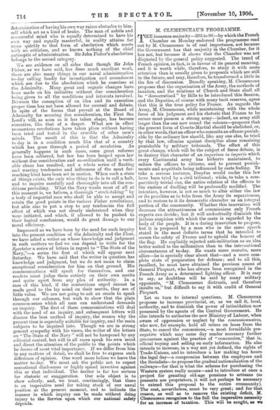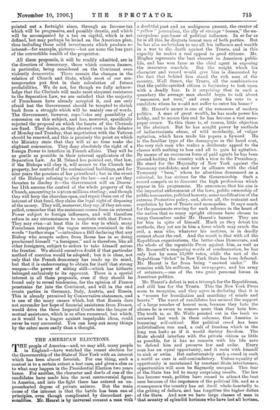M. CLEMENCEAITS PROGRAMME. T HE immense majority-395 to 96—by which the
French Chamber on Monday endorsed the programme read out by M. Clemenceau is of real importance, not because the Government has that majority in the Chamber, for it ha,s not, but because it shows that the Chamber was not disgusted by the general policy suggested. The trend of French opinion, in fact, is in favour of its general meaning, and it is worth while, therefore, to study it with more attention than is usually given to proposals which are still in the future, and may, therefore, be transformed a little in the fire of discussion. Broadly speaking, M. Clemenceau proposes that the organisation of the Army, the methods of taxation, and, the relations of Church and State shall all be " democratised " by Bills to be introduced this Session, and the Deputies, of course with many tacit reserves, agree that this is the true policy for France. As regards the Army, M. Clemenceau, while maintaining with the whole force of his judgment and his rhetoric that France to be secure must possess a strong army—indeed, an army still larger than the one now round the colours—proposes that the present form of Courts-Martial should be abolished, or, in other words, that an officer who commits an offence punish- able by the ordinary law should, like any one else, be tried by that law, offences against discipline alone remaining punishable by military tribunals. The effect of this great change, which will be the subject of fierce debate, is to destroy that character of an imperium in imperio which every Continental army has hitherto maintained, to reduce the officers to citizens, and to prevent punish- ments and acquittals being influenced by caste feeling. To take a serious instance, Dreyfus would under this law have been tried by a civil tribunal ; while, to take a com- paratively trivial one, the entire relation of the officers to the custom of duelling will be profoundly modified. The intention, however, is not so much to alter either the law or its penalties as to take from the Army its separateness, and to restore to it its democratic character as an integral portion of the community. Whether this innovation will decrease the attractiveness of commissions only French experts can decide ; but it will undoubtedly diminish the jealous suspicion with which the caste is regarded by the body of the people. It is a daring innovation to propose, but it is proposed by a man who in the same speech stated in the most definite terms that he intended to secure the safety of France and to uphold the honour of the flag. He explicitly rejected anti-militarism as an idea better suited to the millennium than to the international circumstances of to-day. He wants more recruits, more allies—he is specially clear about that—and a more com- plete state of preparation for defence ; and to all this, recollect, he must have obtained the previous assent of General Picquart, who has always been recognised in the French Army as a determined fighting officer. It is easy to say, as doubtless will be said by many military opponents, " M. Clemenceau distrusts, and therefore insults us," but difficult to say it with credit of General Picquart.
Let us turn to internal questions. M. Clemenceau proposes to increase provincial, or, as we call it, local, authority, and to diminish the power of intimidation now possessed by the agents of the Central Government. He also intends to authorise the new Ministry of Labour, when aware of oppression or neglect by the concessionnaires, who now, for example, hold all mines on lease from the State, to cancel the concessions,—a most formidable pre- rogative which may some day render necessary further guarantees against the practice of "concussion," that is, official buying and selling on early information. He also intends to increase, in a way not yet defined, the rights of Trade-Unions, and to introduce a law making ten hours the legal day—a compromise between the employers and the Socialists—to propose the gradual nationalisation of the railways—for that is what the scheme for purchasing the Western system really means—and to introduce at once a project for granting old-age pensions to artisans (as peasants are proprietors, it will not perhaps be necessary to extend this proposal to the entire community). The cost, nevertheless, must be very great; and for that reason, as well as to remove the existing deficit, M. Clemenceau recognises to the full the imperative necessity for an increase of taxation. This will be sought, as we pointed out a fortnight since, through an Income-tax which will be progressive, and possibly drastic, and which will be accompanied by a tax on capital, which is not defined, but may perhaps be levied on the American plan, thus including those solid investments which produce no interest—for example, pictures—but are none the less part of the convertible wealth of the proprietor.
All these proposals, it will be readily admitted, are in the direction of democracy, those which concern finance, in particular, being considered on the Continent even violently democratic. There remain the changes in the relation of Church and State, which most of our con- temporaries put first in their calculation of future probabilities. We do not, for though we fully acknow- ledge that the Clericals will make most eloquent resistance to the Separation Law, we are satisfied that the majority of Frenchmen have already accepted it, and are only afraid lest the Government should be tempted to shrink back from a struggle which will be mainly one of words. The Government, however, repudiates any possibility of concession on this subject, and has, moreover, specifically rejected the proposal on which the hearts of the Clericals are fixed. They desire, as they showed even in the debates of Monday and Tuesday, that negotiation with the Vatican should be renewed, and this is precisely the point on which the Ministry state that they will at no time make the slightest concession. They deny absolutely the right of a foreign Power to interfere in French affairs. They will be as gentle as possible in their internal application of the Separation Law. As M. Briand has pointed out, that law, if the Bishops will obey it, will secure to the Church her property, her control of the ecclesiastical buildings, and for nine years the pensions of her priesthood ; but in the event of the Bishops refusing to obey the law—and as yet they threaten to disobey it—the Government will on Decem- ber 11th assume the control of the whole property of the Church, amounting to sixteen millions sterling ; and though they will keep the churches open, and repair them out of the interest of that fund, they claim the legal right of disposing of the money. They will, moreover, they say, if they are com- pelled, remember that the resistance comes from an external Power subject to foreign influences, and will therefore refuse in any circumstances to negotiate with that Power. They may even—at least this is the way in which many Frenchmen interpret the vague menace contained in the words "further steps "—introduce a Bill declaring that any Bishop who accepts orders from Rome has in so doing proclaimed himself "a foreigner," and. is therefore, like all other foreigners, subject to orders to take himself across the frontier. We should ourselves doubt if that particular method of coercion would be adopted ; but it is clear, not only that the French democracy has made up its mind, but that it is endeavouring to obtain for itself that strong weapon—the power of sitting still—which has hitherto belonged exclusively to its opponent. There is a special interest in all these proposals, even if they should be found only to reveal tendencies, for the opinion of France penetrates far into the Continent, and will in the end create parties in Germany, Italy, Austria, and Russia. This is already perceived by Conservative statesmen, and is one of the many causes which, but that Russia dare not surrender her hope of financial assistance from France, would drive the three Imperial Courts into the league of mutual assistance, which is so often rumoured, but which, as it would be a league against impalpable ideas, could never be very successful. You can keep out many things by the sabre more easily than a thought.















































 Previous page
Previous page